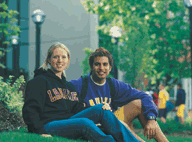Doctor of Philosophy in Music
The objectives of the PhD in Music program are to produce strong independent researchers in the practice-based and evidence-based fields of either Community Music, or Music Therapy. Through exploring commonalities of two fields that combine music with health and wellness, along with societal concerns, students will enhance the quality of their research-informed practice and engage in, and promote, interdisciplinary research.
This PhD in Music is not based on traditional courses, rather, credits are obtained through the various means listed below. The program consists of 12 credits, comprised of a combination of Doctoral Seminar Special Topics (DSSTs), independent directed studies proposals (maximum 2, totaling 1.0 credits) relevant to their research topics as electives, seminars or symposia, research supervision, and final dissertation writing and defense. Regular consultations with a faculty advisor and the student (peer-to-peer) collaborative learning community (CLC) provide structure in meeting pre-determined milestones throughout the degree program. The full-time program is designed to be completed in four years, and the part-time program in six years.
Successful applicants must have completed a masterís program in areas such as Music, Music Education, Fine Arts, Music Therapy, or Community Music with a minimum average of A-. Applicants holding an honours undergraduate degree in in Music/Music Therapy/Community Music and a masterís degree in allied fields such as Social Work, Psychology, Pastoral Counselling, Music Education, Early Childhood Music, Pedagogy, Leisure Studies, or other related fields may be considered.
The application process will consist of a detailed proposal for research in topics applicable to Community Music practice or Music Therapy practice, an interview, three (3) academic reference letters, and an example of graduate-level writing. Applicants to this program will indicate either (a) Community Music or (b) Music Therapy as their primary field of proposed study. Documented field experience in the applicantís area of study will be considered an asset.
Applicants whose language of instruction was not English must furnish evidence of proficiency in English prior to admission, in accordance with university requirements.
To obtain the 12 credits, students progress under the supervision of the Graduate Program Coordinator and Dissertation Advisor to satisfy milestone requirements, the Doctoral Seminar Special Topics Intensives, or elective courses and a dissertation.
Students who have not completed a masters-level research methods course will be required to take such a course in the first year of the program.
Note: Each year, students are required to participate in at least 2 DSSTs, and/or in addition to 1 approved elective. The elective requirement may be fulfilled by completion of the third DSST annually, or through credit earned for another Laurier graduate seminar course or an approved independent directed study. Two DSSTs (MU701 and MU812) are mandatory for all students.
The research supervision will continue each year (MU704, MU804, MU808, MU813). Students will enrol in MU799 in their third term of registration and complete by the end of year 2 (term 6).
Year 1: MU701 - DSST 1: Advanced Research Intensive, MU704 - Research Supervision 1, 2-3 DSSTs, MU799 - Comprehensive Examinations
Year 2: MU804 - Research Supervision 2, 2-3DSSTs, MU799 - Comprehensive Examinations
Year 3: MU808 - Research Supervision 3, 2-3 DSSTs, MU899 - PhD Dissertation Writing 2 and Oral Defense
Year 4: MU812 - DSST 12: Advanced Research Dissemination, MU813 - Research Supervision 4, any remaining DSSTs, MU899 - PhD Dissertation Writing 2 and Oral Defense
In planning the topics for DSSTís the studentsí research interest and needs, will inform the design, topic, and schedule of delivery.
Following successful completion of all other requirements, the student must complete, under the supervision of a dissertation advisor, an original research project (MU899) on an advanced topic. The Regulations Governing the Doctoral Dissertation will govern the dissertation format and the dissertation examination.






